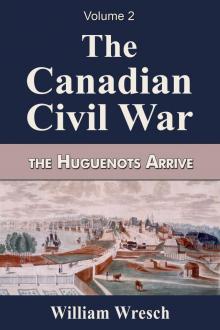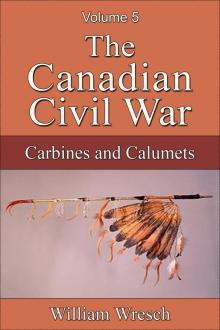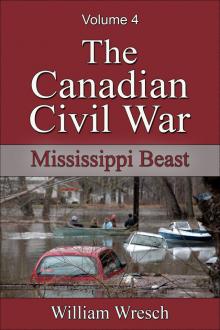- Home
- William Wresch
The Canadian Civil War: Volume 4 - Mississippi Beast
The Canadian Civil War: Volume 4 - Mississippi Beast Read online
The Canadian Civil War
Volume 4
Mississippi Beast
By William Wresch
Copyright 2014 William Wresch
Thank you for downloading this ebook. This book remains the copyrighted property of the author, and may not be redistributed to others for commercial or non-commercial purposes. If you enjoyed this book, please encourage your friends to download their own copy from their favorite authorized retailer. Thank you for your support.
Chapter 1 –
It started at Lambeau Field
Spring in Green Bay lasts about three weeks. The snow melts, pot holes appear everywhere, garbage that has been hidden by the snow is now visible at every curb, but people smile. They are happy they can take their parkas off, and they are happy they have a few days before the mosquitoes arrive. In other words, these are the best days of the year.
Things were also good for Elise and me. We had the National Cathedral reserved for our wedding May 28, and while we knew we would have to postpone until fall when the political scene was more stable, politics was trending in the right direction. The April elections had shown the Heritage Party to be weaker than it had appeared. Where some had expected it to take over the Louisiana Legislature, it only had a slight plurality. It would form a government there, but it would need the involvement of at least one other party -- a power-sharing arrangement that should moderate their damage – at least in theory.
My classes were winding down, and while I had arrived back on campus a week late (and completely unprepared for class), there had been no serious repercussions. In fact, my contract had been extended for an additional year. Maybe someone called someone. I don’t know. In any case, my graduate students were doing pretty good work, and were getting used to the idea that maybe the U.S. was not the worst country in the world and had a history worth studying. My undergraduates still thought the U.S. was a pretty awful place, and I was incredibly prejudiced, but they at least became a little more accurate in the names and dates of events they chose to hate.
Elise was still working long hours, but she found one evening a week to spend with me, and Saturdays she was now sometimes home early in the afternoon. Sundays she spent an hour answering emails while I made breakfast, but then she stayed away from her computer and phone while we went to mass and then to her parents’ home for Sunday dinner.
Like the rest of Green Bay, I thought these were the best days of the year. If only they had lasted a little longer. But the second week in May a training base for Canadian reservists declared it was only responsible to take orders from the “legitimate provincial government.” Back in the good old days, the base commander would have been put some place until he sobered up, but these were not the good old days. The commander – and it appeared most of the senior officers at the base – made a public statement to the local media, and then locked the gates. Insubordination was bad, of course, but two things made the situation much, much worse. First, this was not some tiny base with fifty fat reservists who had cabin fever from a long winter. This was one of the largest and most well-provisioned and well-staffed bases in the country. And second, the base was in Arkansas.
Maybe the location was the most important. If it had been Louisiana, the problem might have been seen as just one more provocation from an extreme corner of the country. But Green Bay had been working on Arkansas. Elise and half her department had been down there all winter giving out dollars for government projects, and hoping to make friends in the process. If Arkansas stayed with Green Bay, then Louisiana was isolated, and so weakened it was less likely to provoke anything leading to independence. But if Arkansas joined Louisiana… The alarm bells ringing all over government offices in Green Bay were deafening.
I lost Elise for a solid week as she went to endless research and strategy meetings. She got home most nights too tired to talk, and when she did talk, there was a limit to what she could tell me. But confidentiality aside, I could quickly gather this event had been a complete surprise. No one had prepared any response. No one had even considered such an eventuality. They had no idea what to do.
Back at the university we were just getting started on exam week. As you might predict, I was asked multiple times – “Will we still have exams?” That call was up to the Chancellor, but based on what I was hearing in faculty meetings, the academy was to continue as usual. That’s what I told students, and that’s how I prepared. I got some fairly creative excuses from a few students about why they should be excused from finals and still pass the class. I told them to take it up with the dean. I figured he could use the entertainment. For the vast majority of students, we just kept with the schedule. Something disturbing was happening in Arkansas, but that was pretty remote, and while it might lead to all kinds of bad things, for the moment at least, people still wanted grades and diplomas, and the jobs they would get after graduation.
The spring social scene in Green Bay revolves around the emerging lacrosse season. Any new player on the team got face time on the evening news, and water-cooler conversation involved intense discussions over which team might challenge in the division. Lacrosse matters in Green Bay. We might think it is silly that anyone would waste time on anything other than cricket, but the French are the French and that is the way their world turns. I say all that to preface the first real incident after the base closure that had an impact on the average person in Green Bay.
My father’s company had a reserved box at Lambeau Field, and that is where I spent my Sundays. Why not, Elise was now in the office pretty much non-stop, and the food was free. The company used me as a kind of social link to various government folks, so you could even claim my attendance was a kind of “work.” So I was there about two weeks after the base announcement when the incident happened. Historians are always reluctant to name the real start of any war since so much can be assigned the blame, but when the full history of this war is written, I expect many to say the first “bullet” was fired that afternoon at Lambeau Field.
It started with the worst scheduling idea in the history of sports. Months before, some genius decided to invite the Arkansas Otters up for an exhibition game. It would be a chance to build friendships through sports, etc. Whatever back room marketing genius picked that matchup had never actually attended a lacrosse match and seen what fans look like. They sit out in the parking lot and drink endless bottles of cheap wine near their cars, a routine they call “tailgating.” Hours later they stagger into the stadium and shout obscenities at opposing players for the entire game. “Friendship through sport” existed in the imagination of people who watched too many movies.
As bad as these things always are, with the constant harassment of opposing players (and any opposing fans dumb enough to attend), this Sunday was worse. The revolt at the reserve base had people angry, and maybe scared, and if you add barrels of wine to that mix, you get thunderous chants accusing the hapless Otters of any kind of vile obscenity known the man or beast. The Otters could have just put in ear plugs and waited for three hours until the clock ran out and they got to return to the safety of their province. But these were not normal men, these were lacrosse players. You weren’t going to tell them they had mated with farm animals and get away with it. No sir. They had their honor to uphold. So we were no more than ten minutes into the match when three of their guys get off the bench and go charging up against the seats, only to be drenched in wine thrown from a hundred cups. This would have been a real good time for cooler heads to call the match and get everyone to safety, but cooler heads weren’t running the match, lacrosse team owners
were. The match would continue, after all, it was needed to achieve friendship through sport.
While that was occurring, there was the usual mayhem on the field that occurs any time you give twenty men a chance to run around and attack each other with sticks. The body checking was rough, tripping was almost universal, and then one of the Lambeau Loons totally lost his mind. In replays you could see he had just been hit really hard by one Otter as another tripped him from behind. It was dirty, but not that uncommon for lacrosse. But what people saw was his response. Getting up off the ground, he bent his knees, reached back with his stick, took a full swing with all his muscles tensed, and hit an Otter across the neck. Hundreds of folks will tell you they could hear his neck snap from clear across the field. The man was dead before he hit the ground. The Jumbotron showed the murder on a screen a hundred feet high. Everyone saw it, and everyone reacted. And – here’s where it gets really bad – the first reaction was a cheer from the crowd.
To me, that was the real start of the Canadian Civil War.
People tell you that when really dramatic things occur time seems to stop or slow way down. Maybe we just pay more attention. I know I can describe the next hour or so in detail like every instant was etched in my memory. I remember the sounds. There was the huge cheer when the Otter went down. And then the dead silence when everyone saw him crumpled on the grass unmoving. There were a few drunks who shouted jeers like “Take that back to Arkansas” but even they stopped after a few more shouts. Then there was complete silence. Seventy thousand people stood in awe. Had they really just seen what they had just seen?
The players on the field continued to run for a few more seconds until they noticed things had changed. Those at the far end of the field looked up at the Jumbotron, saw the replay, and then raced to the fallen man. And yes, there were replays of the hit. The jackass running the AV systems for the stadium showed the killing at least five times until someone pulled him away from his equipment and shut down the screen. I’d like to think he is unemployed now, but who knows? Besides, you could bet the hit would be rebroadcast on television time and time again – and it was. We learned the New Orleans stations were showing it in super-slow motion for days on end, despite the pleas of the player’s widow.
But all that came later. At the moment we had players running to the fallen man, the Jumbotron showing the killing, and the crowd standing and staring, leaning forward as if tilting a few inches closer would make the scene clearer. Up in our box, we had the usual split between the people who had some interest in the match – about a dozen or so of us, who had taken seats near our windows and actually saw the hit – and an equal number of folks who were standing in the back of the box eating crepes and refilling their wine glasses. None of them had been paying any particular attention to the game; they were here to do business, or at least to pretend to do business so they could get free drinks and free access to the game. None of them saw the hit. They just knew something had changed when the normal din of an athletic event was replaced by a cheer followed by absolute silence. They walked closer to the windows and asked what had happened, but the only response any of us made was to point to the damn Jumbotron and its continuing replay of the murder.
On the field there was a sprint from the sidelines as coaches and doctors from both teams rushed to the fallen man. They fell to their knees at his side and huddled over him. Most had phones out and were calling for emergency equipment. Two men brought over a backboard and laid it by the side of the player. Another man wheeled over a crash cart to restart the player’s heart. It only took a minute or two for an ambulance to come out onto the field. This is a rough game, so the place was very prepared for injuries.
But of course, this was not an injury. We had all seen the hit time and time again. The doctors could call for all the equipment they wanted, and folks could hope all they wanted, but the player was dead. Looking down from our box, we could see the doctors struggle. His neck was snapped. Could they move him to open an air way? He wasn’t breathing. Could they start CPR without moving his head? In the end, they went through the normal procedure for a neck injury and brought over the backboard and strapped him to it, then put him on a gurney and wheeled it into the ambulance. I don’t know how fast an ambulance can go on a field like that, but it seemed to be going less quickly than maximum, which seemed yet one more sign that this case was over.
With the ambulance gone the folks on the field broke into two groups. The officials met together, presumably to do the obvious and end this “exhibition” that had exhibited far more than anyone could want. The players meanwhile, squared off, with the Otters surging toward the Loons, some in the group trying to restrain some of the men who had their sticks up and were ready to use them. The Loons backed off. At a distance it was hard to be certain of gestures, but it appeared there were some motions toward apology from a few Loons, but the Otters were having none of it. One man in particular stood forward and raised his stick about his head and pointed to himself, seeming to say “You want to fight? Here I am. Let’s go.” He issued the challenge over and over, but the Loons just kept backing away. They were done for the day. The officials seemed to finally agree to the obvious, and they ended the match. They motioned to the coaches present that the match was over, and they left the field without making any public announcement, not that one was needed. The folks in the stands were drunk, but they weren’t imbeciles.
Gradually the stands emptied. I had never seen our box clear so fast. We had wine left and a pile of food that ended up in the trash. No one in our box had much to say. We wouldn’t be closing any sales that day. Out in the stands there was some chatter, a few folks here and there seeming to reenact the hit, a few loud voices, but mostly quiet as people walked back to their cars. I have no idea what they were thinking, but I have to believe most of them knew on some level that a line got crossed that day. Lambeau would now be remembered not as a place of champions but as the site of a murder. And Green Bay? The city was different now. Maybe its character had changed, maybe it had just shown a different side of its character, but it was now the place where people cheered while a man died. What kind of city did that?

 The Canadian Civil War Volume 2- The Huguenots Arrive
The Canadian Civil War Volume 2- The Huguenots Arrive The Canadian Civil War: Volume 5 - Carbines and Calumets
The Canadian Civil War: Volume 5 - Carbines and Calumets The Canadian Civil War: Volume 4 - Mississippi Beast
The Canadian Civil War: Volume 4 - Mississippi Beast The Canadian Civil War: Volume 1 - Birth of a Nation
The Canadian Civil War: Volume 1 - Birth of a Nation The Canadian Civil War: Volume 3 - West to the Wall
The Canadian Civil War: Volume 3 - West to the Wall